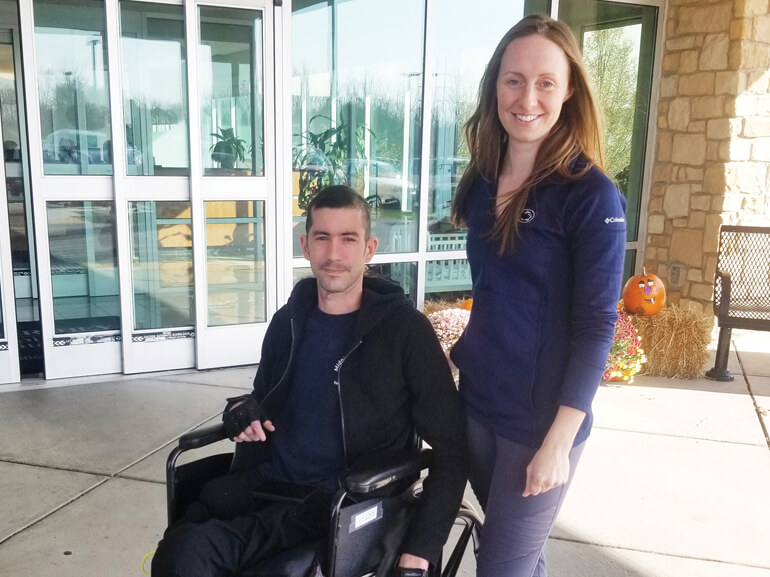Gary's story

Coffee never tasted so good
Over the course of their marriage, Jessica Davis brought her husband, Gary, a cup of coffee hundreds of times. There was never a sweeter ask, however, than – three months after a fiery roll-over car accident that nearly killed him – when Gary scribbled “coffee” on a hospital whiteboard and brought hope back to his family.
The July accident left Gary, 35, fighting for his life. He sustained multiple injuries including a traumatic brain injury, stroke, spinal cord injury, extensive third degree burns, multiple fractures and an eventual amputation secondary to his other injuries.
“I had my doubts at times,” Jessica said. “He was in a coma. We didn’t know for how long, but I knew he would wake up and recover. When he woke up, he tried to write three times, and on the fourth time, he got it (the word coffee).”
Gary had a long period of healing at Lehigh Valley Hospital. The staff at Penn State Health Rehabilitation Hospital (PSHR) followed up with him twice a week to ensure he was medically stable enough to be transferred to the rehabilitation hospital. Once he was off a ventilator and his burns were healing, Gary was ready to move to an inpatient rehabilitation program.
He arrived at PSHR and began an aggressive therapy program designed to help him get home and back to the couple’s two children, ages two and four. Therapy goals were set and then adjusted each time Gary cleared a medical hurdle, such as having his tracheostomy tube removed, getting into a wheelchair from the bed, improving his functional mobility and having his feeding tube removed. Gary had lost 30-40 pounds since the accident and needed to build upper body and core strength to transfer from his bed to a wheelchair.
“Coming to rehab was a good experience and very helpful, especially because I am in a wheelchair now (which is hell, but a step in my recovery),” notes Gary.
Gradually, Gary began participating in physical, occupational, speech and recreational therapies. Gary recalls, “Everything pertained to what I was trying to do. My goals were set by themselves and achieved as I moved with my timeline. For example, my trach came out, then my feeding tube, then my catheter and soon I was eating and drinking (even coffee). Speech therapy was my favorite because I was eating!”
In physical therapy, Gary recalls, “My first therapist really pushed me hard and was insistent. She was almost unlikeable but I respected her and knew she was doing her job. Later in my program, I worked with another team that focused on my transition to home. They thought outside of box about what works for us as a family. They went the extra mile to figure out a chair lift for our home.”
In occupational therapy, Gary’s program focused on upper body and core muscle strengthening. “My triceps especially. My left side was weaker than my right side.”
Gary also worked with Norway, the rehabilitation hospital’s therapy dog, “He’s my dude! We always owned labs growing up and he has such a calm demeanor, it really helps.”
Recreational therapy also became part of his schedule. “We played guitar, we played cards. I got it here in my head but my hands don’t have the dexterity yet.”
Before heading home, Gary’s therapy team completed an evaluation at his residence. Working with Jessica, the team created a plan for extensive home preparations and improvements including installation of laminate floors and a stair lift so Gary could move between upstairs and downstairs. The family also plans to remodel the master bathroom so Gary can use it independently.
“Rehabilitation gives recovery routine. Prepare yourself for some time. The consistency in the program is key.” Gary said. “Therapists push for you. They are on your side and excited for you when you reach a goal.”
Gary plans to continue in-home therapy and outpatient services at PSHR. His goal is to get stronger and get a prosthesis so he can participate in outdoor activities such as hunting and fishing with Jessica and his children. “I want to get us back to the lifestyle we lived before and doing things together. While I know I will never be 100 percent, it’s small, step-by-step progress,” said Gary.
Gary and Jessica plan to visit the trauma team who cared for him after his accident so they can see how far he’s come. They also hope to travel soon, perhaps on a cruise.